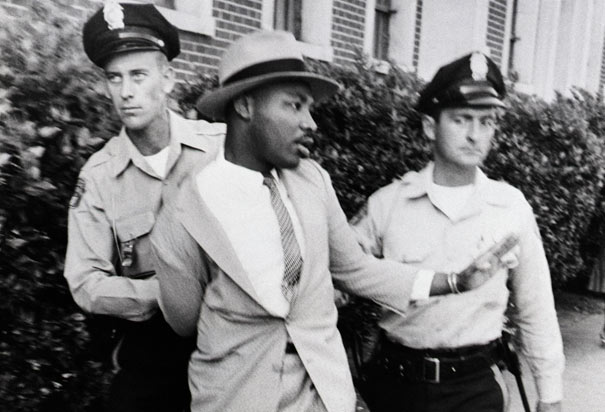Actually, a guest musing by MT Dávila, (Ph.D., Boston College), Assistant Professor of Christian Ethics, Andover Newton Theological School:
Four years ago, when I first put down Harry Potter and the Deathly Hallows, I cried. I imagine that this weekend, as the second installment of this final chapter in J.K. Rowling’s world is released, I will cry in the theatre as well. For me the Harry Potter series asks one of the most serious questions any person of faith can ask of themselves: am I authentically living to the deepest convictions of my faith? As a Christian I knew four years ago, as I know now, that I am not. Deathly HaLLOWS in particular presents for us an indictment on cheap grace and an invitation to costly discipleship. It is no coincidence that Bonhoeffer’s understanding of being a Christian in a time of crisis comes into relief in this story since the Ministry of Magic portrayed in this last volume purposely resembles the Third Reich and its insistence on the divine favor of a pure race. In her 2008 commencement address at Harvard University, J. K. Rowling describes how her time working at Amnesty International exposed her to so much of the evil human beings can do to each other through unjust laws and regimes, experiences that she feels informed her writing deeply.
Jason Isaacs, who portrays Lucius Malfoy – a sort of right-hand man to evil throughout the series, commented on his performance and how he got into character. He points out that, unfortunately, one does not have to go too far to find blogs and groups speaking about protecting the pure race, the dangers of watering down national identity, the threat to the nation by this or that group. Indeed. One of the most terrifying scenes in the book, portrayed superficially in the first installment of the Deathly Hallows movie, is the trial of ‘mudbloods’ (wizards coming from non-wizard families or mixed families) conducted at the Ministry of Magic. The scene emphasizes that solely by accident of birth – what particular family one is born into – can one be persecuted, jailed, made to disappear, or delivered to the dementors (a sort of soul-killer, if you will). The charges against ‘mudbloods’? Stealing wands (the livelihood of wizards), taking student spots at the wizarding school, Hogwarts, and overall taking advantage of all the privileges of birth that wizardry affords. Through the books we become aware of the transition between a Ministry of Magic amenable to wizardry being shared by those outside of the ‘pure’ family lines, to a Ministry beset in establishing laws against schooling of mudbloods, registering their names through a special office of the Ministry, and sending out special agents to raid shops, establishments and homes in order to round out those who cannot provide proper documentation that their bloodline is pure (these scenes are poignantly and swiftly portrayed in The Half-Blood Prince and Deathly Hallows , Part I). Sounds slightly familiar?
With ruthless anti-immigration laws in Arizona and Georgia, and many states initiating their “Secure Communities” programs, we are aware that indeed such scenes as the one above, are playing out in our own land and other countries, constantly. In the city of Boston alone, there is great concern on all sides on the implications of becoming a ‘secure community’, the effects that would have on the social fabric of the city, especially the trust that police and other agencies must gain from the population in order to provide for the common good. The mandatory reporting of the immigration status of any criminal offense is causing much pause in a city (and countless others) known for its diversity and hospitality. It is certainly causing much pause in this particular Christian asking herself, what would Harry do?
I do not ask this in jest, the obvious parallels between the necessary sacrifice of Harry’s life and Jesus’ sacrifice on the cross have already generated a number of volumes and courses on the theological messages of the books. However, for me, the question is as fundamental as the one I raised above: am I living an authentically Christian life? More specifically, what costs am I bearing for discipleship? During my interviews for teaching jobs, one head of a school asked me the following: “in ten years, when I get the call that you have been arrested, what will it be for?” Besides utter shock at the question, there was an obvious answer. This person was asking me about costly discipleship, whether I felt that there were any issues in today’s world in which the playing out of my Christianity would demand costly personal sacrifice. The obvious answer for me was immigration, and yet I have hesitated in my activism. I am too comfortable in my ways to put much in the line for the life of those persecuted by our inhumane laws. Without risk-taking, I am no more than a cog in the Ministry of Magic machine. In the section on Poverty of the Church in the Medellín (1968) documents by the Conference of Bishops in Latin American, we hear how evangelical poverty must be lived: “All members of the church are called to live in evangelical poverty, but not all in the same way, as there are diverse vocations to this poverty, that tolerate diverse styles of life and various modes of acting.” We may not all be asked to risk arrest in order to promote a more just and humane society, but we are all asked to take on some of the cross that discipleship demands, whether in our places of business, advocating for the D.R.E.A.M. act in our own institutions, or speaking out in ways that may sometimes arrest our careers.
In 2006, Cardinal Roger Mahony of Los Angeles raised the banner of costly discipleship and the way we treat the human family. He was clear then, and has continued to state, that the Christian life cannot tolerate the breaking up of families over unjust immigration laws, the indefinite detention of heads of household or minors as young as 12 or 13, unhealthy and dangerous working conditions imposed on humans without U.S. citizenship. And, at the possibility that new anti-immigration laws would make it illegal to perform charitable works toward immigrants in Church-run facilities, Mahony clearly noted that Christianity would demand that the Church stand against unjust laws and risk persecution for its stance of discipleship. This is a call for costly discipleship that can be heard throughout many Christian denominations, the Unitarian Universalist Association, and a number of Jewish and Muslim groups in the U.S. When people of all faiths ask themselves the very hard question of costly discipleship and authentic living, the challenge of how we treat the least in the human family and how our laws affect the integrity of the human community always rises as an urgent demand for personal sacrifice for the sake of justice.
In light of these considerations, we are sometimes faced with the truth of the current state of our own discipleship. In such cases – whether provoked by the story of a child wizard coming to terms with his own role in history or by the journey of the itinerant teacher from Jerusalem to his unjust death on a cross – tears are in fact a proper response, and also a hopeful one. In the indictment of my personal failure to embrace a costly discipleship I receive an invitation to come near the everyday crosses, take down the crucified people, and join my destiny to theirs.
It is always a welcome moment when a book, a movie, or another cultural phenomenon energizes conversations in Christian ethics that are pivotal for our society. In proposing that this is such a moment, I hope that further conversation and contributions will enlighten what is required of us at this time for the sake of the human family.




Excellent post. I teach a theology course on the Potter novels and their theological depth is more than identifying Harry as a Christ figure. Another important theme in the novels (not as much in the films) is the nature of power. Voldemort prizes coercive power (“Magic is Might”) as a means to attain his end: victory over death. We learn in “The Deathly Hallows” that Dumbledore once succumbed to the attraction of coercive power with tragic consequences. This is one of the issues that Harry struggles with in the same novel (unfortunately glossed over in the films): the power that the hallows represent or the personal sacrifice necessary to destroy the horcruxes. It is Dobby’s sacrifical death to save Harry that provides an important turning point: forego the hallows, destroy the horcruxes.
I submit that Rowling’s exploration of power which begins in the first novel (“There is no good or evil, only power and those too weak to seek it”) is one of the fundamental struggles of Christianity in America today. Why are not more Christians committed to costly discipleship (and I admit my failure here as you do)? Because what passes as mainstream Christianity has succumbed to and promotes the values of coercive power to promote “family values.”